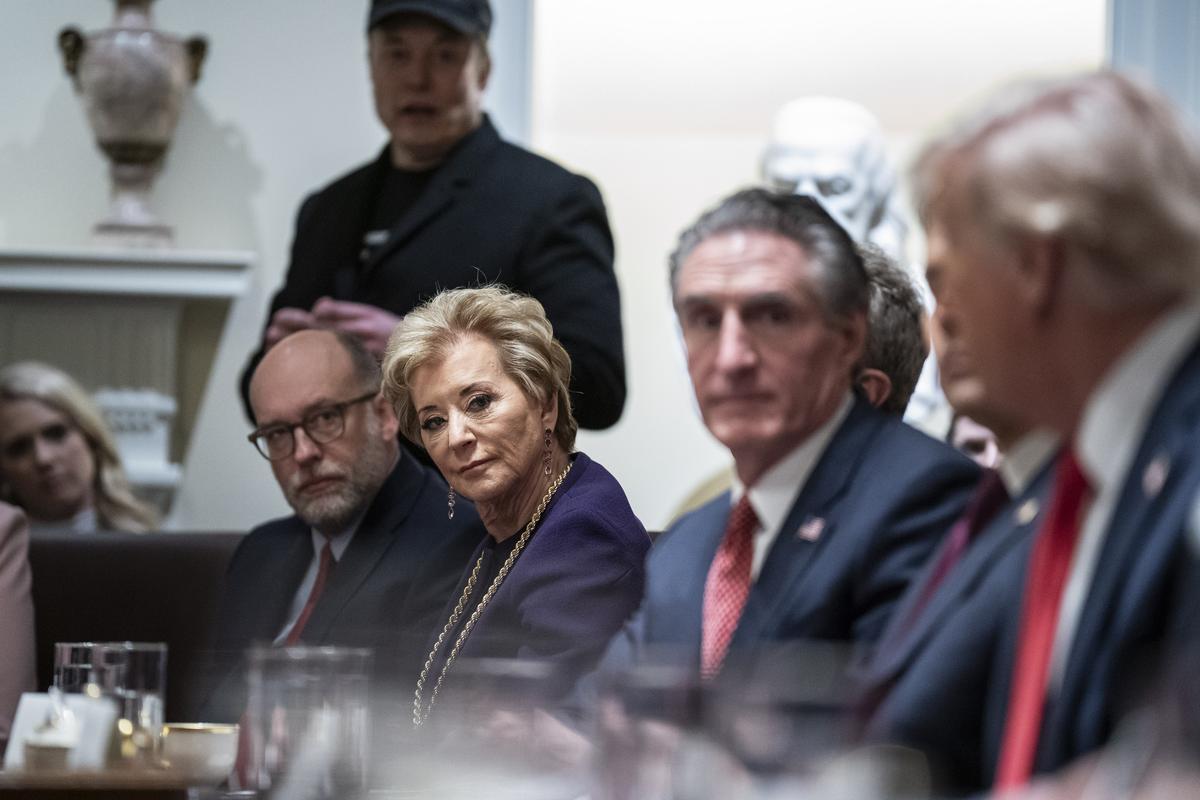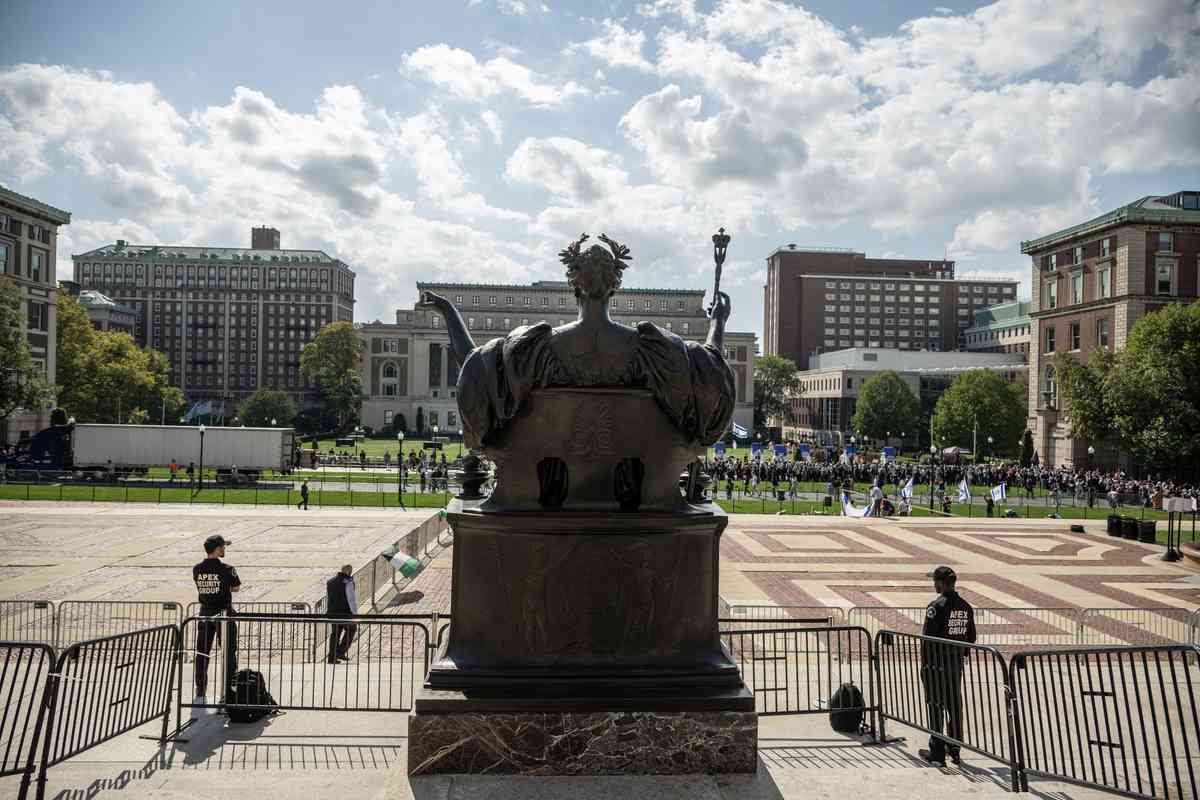
Education Secretary Linda McMahon listens at the first Cabinet meeting of President Donald Trump’s second term in the White House on Feb. 26.
11:54 JST, March 25, 2025
University administrators across the nation are warning that Columbia University’s compliance with the Trump administration’s demand for sweeping policy changes – with $400 million in federal funding on the line – may have a chilling effect on academic independence.
“There are enormous fears among universities all across the country as to what’s going to come,” said Erwin Chemerinsky, dean of the law school at the University of California at Berkeley. “I think it just emboldens the Trump administration to go after more universities in the same way.”
“When external pressures dictate campus policy or institutional direction, it risks undermining both academic freedom and free speech,” said Mary A. Papazian, executive vice president of the Association of Governing Boards of Universities and Colleges.
The outcry comes after an announcement Friday that Columbia will institute new rules on student protests and discipline, bring in new campus police officers with arrest powers, and begin an overhaul of the university’s Middle Eastern, South Asian and African studies department.
Those changes dovetail with recent demands by Trump administration officials, who declared in early March that they planned to cancel $400 million in federal funds and grants because of what they described as the university’s failure to protect Jewish students after protests over the Israel-Gaza war that rocked the campus last year.
In a March 13 letter, officials with the General Services Administration, the Education Department and the Department of Health and Human Services said the university needed to take significant actions before the government would even consider renegotiating the funding freeze. Those steps were necessary, they said, to protect students from antisemitic violence and harassment on campus.
“We expect your immediate compliance with these critical next steps,” the letter said.
Columbia, it appears, was willing to comply.

Students at Columbia University in New York protest the war in Gaza on Oct. 7, 2024, the first anniversary of the Hamas attack on Israel.
In a message Friday, Columbia’s interim president, Katrina Armstrong, announced what she described as “a principled and methodical approach to meeting the moment’s challenges.”
She made minimal mention of the back-and-forth with the Trump administration or the prospect that the university would lose $400 million in federal grants and contracts.
Instead, Armstrong framed these changes as common-sense reforms that were already in the works.
“At all times, we are guided by our values, putting academic freedom, free expression, open inquiry, and respect for all at the fore of every decision we make,” she wrote in her letter.
Under the university’s new rules, protests inside academic buildings will be forbidden. A squad of 36 new campus police officers will have the power to arrest students or remove them from campus. Masks worn with the intention of concealing a person’s identity will be banned, although masks worn for religious or medical reasons will be allowed. Students who protest while wearing a face covering must provide their university ID if asked by a campus public safety officer.
The changes will extend beyond protest policies to questions of curriculum: There will be an internal review of the university’s department of Middle Eastern, South Asian and African studies, the Center for Palestine Studies, and similar academic entities. The review is intended to address “many concerns about how the history of Israel and Zionism is taught.”
In a Sunday interview on CNN’s “State of the Union,” Education Secretary Linda McMahon said she was pleased with the actions she’d seen so far from Columbia administrators – and with the interim president in particular.
“She wanted to make sure there was no discrimination of any kind. She wanted to address any systemic issues that were identified relative to the antisemitism on campus,” McMahon said, pointing out that she and Armstrong had exchanged personal cellphone numbers.
McMahon said she was optimistic that the $400 million in federal grants and contracts held up by the administration would soon be unfrozen.
“They have worked very hard in a very short period of time,” McMahon continued. “… And I believe that they are on the right track so that we can now move forward.”
On Monday, a group of more than 150 faculty members gathered outside the wrought-iron gates of Columbia University, now cordoned off by a security booth that monitors people entering and leaving the campus. Among a throng of umbrellas, professors held up signs calling to “Defend Democracy” and “Defend Serious Thought.” Others displayed red badges to “Protect Academic Freedom.”
Professor Ansley Erickson joined the crowd despite being on sabbatical from Teachers College, where she leads courses on the history of American education.
“I’m worried that the university’s decision could change how civil rights enforcement works,” Erickson said. “If the Trump administration can declare by fiat that the university is in violation of Title VI protections and withhold funding on that basis – without due process or review – every school district in this country could potentially be told that they are in violation of civil rights law and asked to negotiate.”
Representatives of the Columbia faculty senate also attended Monday’s protest, calling on the administration to respect the democratic processes that have long governed campus life.
“We have the skills and rights to conduct our own business,” said Julie Crawford, a professor of English literature and member of the faculty senate, which was founded in 1969 amid the Vietnam War. “I would like the administration to stand up for due process. They are creating conditions that make it impossible to teach.”
The threat of $400 million in vanished federal funding for research and operations was a potentially catastrophic prospect for a research institution like Columbia – and especially for the Mailman School of Public Health, where federally funded research grants power graduate studies.
In recent days, free-speech advocates have criticized Columbia’s decision to fold in the face of the government’s demands. That precedent is likely to have a profound impact for higher education around the country, they say.
“By giving in to the Trump Administration’s demands,” said a statement from Donna Lieberman, executive director of the New York Civil Liberties Union, “Columbia sets a dangerous precedent that normalizes government intrusion on academic freedom and student expression.”
“Make no mistake,” Lieberman continued, “Trump and his MAGA movement will not be mollified – Columbia’s appeasement will only embolden them to go further.”
Chemerinsky, of the UC-Berkeley law school, said he thought Columbia acquiesced too quickly.
“One has to wonder, why didn’t Columbia challenge this? Why did they capitulate?” Chemerinsky said. “I think that the answer to that is likely, that they thought that the consequences of fighting were much graver than the consequences of settling.”
Top Articles in News Services
-

Survey Shows False Election Info Perceived as True
-

Hong Kong Ex-Publisher Jimmy Lai’s Sentence Raises International Outcry as China Defends It
-

Japan’s Nikkei Stock Average Touches 58,000 as Yen, Jgbs Rally on Election Fallout (UPDATE 1)
-

Japan’s Nikkei Stock Average Falls as US-Iran Tensions Unsettle Investors (UPDATE 1)
-

Trump Names Former Federal Reserve Governor Warsh as the Next Fed Chair, Replacing Powell
JN ACCESS RANKING
-

Producer Behind Pop Group XG Arrested for Cocaine Possession
-

Japan PM Takaichi’s Cabinet Resigns en Masse
-

Man Infected with Measles Reportedly Dined at Restaurant in Tokyo Station
-

Israeli Ambassador to Japan Speaks about Japan’s Role in the Reconstruction of Gaza
-

Videos Plagiarized, Reposted with False Subtitles Claiming ‘Ryukyu Belongs to China’; Anti-China False Information Also Posted in Japan


























